Jim Lehrer, 1934-2020
A legendary newsman has passed.
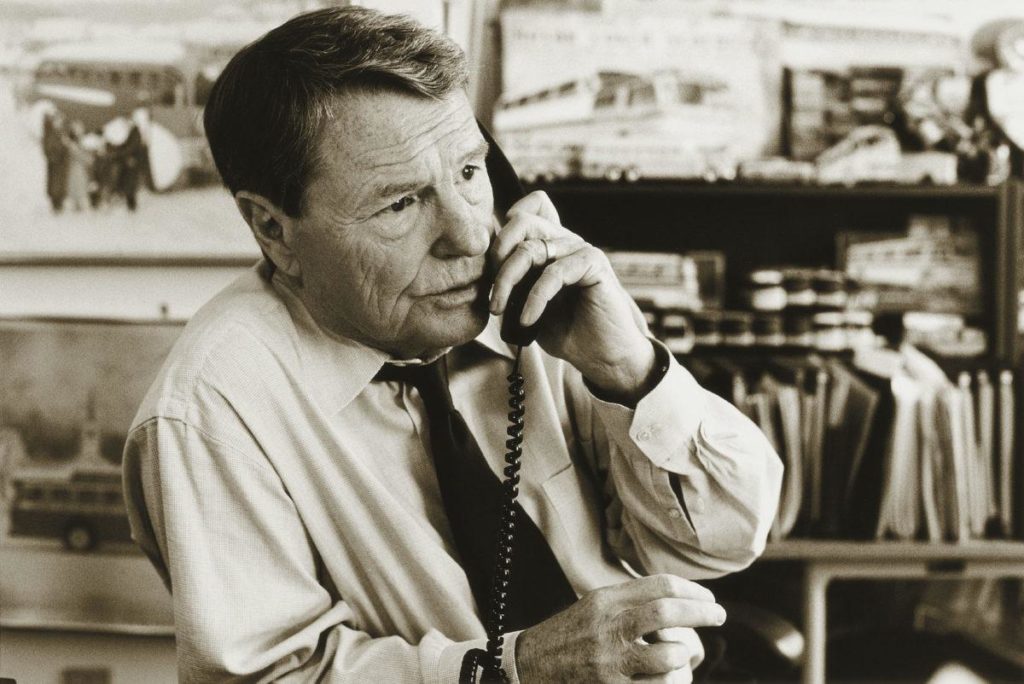
Jim Lehrer, perhaps the last of the great television news anchors, has died at the age of 85.
The press release from PBS, his longtime home:
It is with great sadness that I share the news that co-founder and longtime anchor of the PBS NewsHour Jim Lehrer died today, Thursday, January 23, 2020, peacefully in his sleep at home. Lehrer, born May 19, 1934, served as anchor of the NewsHour for 36 years before retiring in 2011. Lehrer and Robert MacNeil founded the program in 1975, out of their 1973 coverage of the Senate Watergate Hearings on PBS.
“I’m heartbroken at the loss of someone who was central to my professional life, a mentor to me and someone whose friendship I’ve cherished for decades,” said Judy Woodruff, anchor and managing editor of the PBS NewsHour. “I’ve looked up to him as the standard for fair, probing and thoughtful journalism and I know countless others who feel the same way.”
Sharon Percy Rockefeller, president and CEO of WETA, added, “We at WETA are deeply saddened to learn of the passing of our longtime friend and colleague Jim Lehrer, one of America’s most distinguished journalists and a true champion of excellence in reporting. Jim set the gold standard for broadcast journalism in our nation and devoted his life to a vital public service ― keeping Americans informed and thereby strengthening our civil society. Through his extraordinary insight, integrity, balance and discipline, Jim earned the trust of the American people, and his important legacy lives on at PBS NewsHour.”
PBS President Paula Kerger also added, ”On behalf of all of us at PBS, we are deeply saddened to learn of Jim Lehrer’s passing. From co-creating the groundbreaking MacNeil/Lehrer Report to skillfully moderating many presidential debates, Jim exemplified excellence in journalism throughout his extraordinary career. A true giant in news and public affairs, he leaves behind an incredible legacy that serves as an inspiration to us all. He will be missed.”
As anchor of PBS’s flagship news program, Lehrer interviewed numerous leading figures including Margaret Thatcher and Yasser Arafat in the 1980s, South Korean President Kim Daejung and Chinese leader Jiang Zemin in the 1990s, and Jordan’s King Abdullah and Afghan President Hamid Karzai in the 2000s.
Lehrer moderated a total of 12 president debates, more than any other person in U.S. history, including all of the presidential debates in 1996 and 2000.
He is the author of 20 novels, three memoirs, and several plays and earned dozens of journalism awards and honorary degrees. He received the National Humanities Medal from President Clinton, was elected a fellow of the American Academy of Arts and Sciences, and alongside MacNeil, was inducted into the Television Hall of Fame.
Prior to his long career at the NewsHour, Lehrer reported Dallas public television station KERA, the National Public Affairs Center for Television, the Dallas Morning News and the Dallas Times-Herald.
Lehrer attended Victoria College in Texas and later studied journalism at the University of Missouri. He served three years as an infantry officer in the U.S. Marine Corps.
He is survived by his wife Kate; three daughters Jamie, Lucy, and Amanda; and six grandchildren.
Colleagues Anne Azzi Davenport and Jeffrey Brown add:
For Jim, being a journalist was never a self-centered endeavor. He always told those who worked with him: “It’s not about us.”
Night after night, Jim led by example that being yourself — journalist, writer, family man, citizen — can be a high calling.For 36 years, Jim began the nightly newscast with a simple phrase: “Good Evening, I’m Jim Lehrer.”
As an anchor of several iterations of the NewsHour, Jim reported the news with a clear sense of purpose and integrity- even as the world of media changed around him.
Jim and his journalism partner Robert MacNeil’s approach to reporting the news became known as the “MacNeil-Lehrer style of journalism.” Their approach helped lay the foundation for modern public media reporting.
The nine tenets that governed his philosophy included the assumption that “the viewer is as smart and caring and good a person as I am,” that “there is at least one other side or version to every story,” that separating “opinion and analysis from straight news stories” must be done clearly and carefully, and last but not least: “I am not in the entertainment business.”
That piece has some good anecdotes about Lehrer’s early days in the news business, including his role in covering the JFK assassination as a young reporter for the Dallas Morning News and his coverage of the Watergate hearings for a predecessor to PBS, where he first teamed with Robert MacNeil.
“We began life in October 1975 as ‘The Robert MacNeil Report,'” Jim said, reminiscing on the 40th anniversary of the Watergate hearings. “And months later, became ‘The MacNeil/Lehrer Report.’ In those days, we dealt with one story for half an hour.”
In 1983, the program expanded to one hour of news and analysis and was renamed The MacNeil/Lehrer NewsHour. Twelve years later, MacNeil retired, and the program became The NewsHour with Jim Lehrer.
Over the years, Jim interviewed numerous leading figures on the world stage, including Margaret Thatcher and Yasser Arafat in the 1980s, South Korean President Kim Daejung and Chinese leader Jiang Zemin in the 1990s, and Jordan’s King Abdullah and Afghan President Hamid Karzai in the 2000s.
Jim daily examined major turning points in the life of the nation and world. He pressed experts from the business world and military brass, as well as America’s top political figures.
During one of Jim’s most notable interviews, he pressed President Bill Clinton about accusations regarding his sexual relationship with White House intern Monica Lewinsky and the subsequent investigation into his conduct.
“The news of this day is that Kenneth Starr, independent counsel, is investigating allegations that you suborned perjury by encouraging a 24-year-old woman, former White House intern, to lie under oath in a civil deposition about her having had an affair with you,” Jim said in the interview with Clinton. “Mr. President, is that true?”
Clinton denied the allegation.
“That is not true. That is not true,” Clinton told Jim. “I did not ask anyone to tell anything other than the truth. There is no improper relationship and I intend to cooperate with this inquiry, but that is not true.”
Jim was calm and careful in moments of crisis, as demonstrated by his coverage of the September 11 terrorist attacks.
“I’m Jim Lehrer. Terrorists used hijacked airliners to kill Americans on this, September 11, 2001,” Jim reported on national television. “Another day of infamy for the United States of America.”
“Jim’s intelligence is so laser-like, no matter what he’s applying it to, that’s how he treats any situation, no matter how we treat a certain news story or what a news story means,” MacNeil said this of his partner.
“I learned a lot from him, about his very direct manner of interviewing,” MacNeil added. “And not being afraid to say ‘you don’t understand’ or ‘you don’t know.’ But also his extraordinary ability to listen. You know the hardest thing to do on TV is to listen.”
There are a lot more reminiscences in the article, reflecting on how revered and beloved Lehrer was in the business. It’s well worth reading in full if you’re of a certain age.
I didn’t grow up on the NewsHour. In those days of having to choose from four broadcast channels and no recording, our family watched CBS until Walter Cronkite retired and switched to ABC because my father despised Dan Rather. But I watched McNeil/Lehrer occasionally while in college and recorded it for years, well into the Lehrer solo era, starting in grad school.
I was also a fan of Lehrer’s novels, particularly his Charlie Henderson CIA series.
While other giants of the business, including Dan Rather and Tom Brokaw, are still alive, Lehrer was almost certainly the last of the great news anchors on the air. Others, including his successor Judy Woodruff, are excellent at their jobs. But Lehrer was a giant in an era when most Americans got their daily dose of the news from television and relied on a single, trusted personality to tell it to them straight.

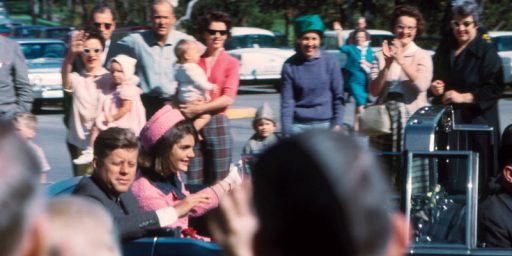
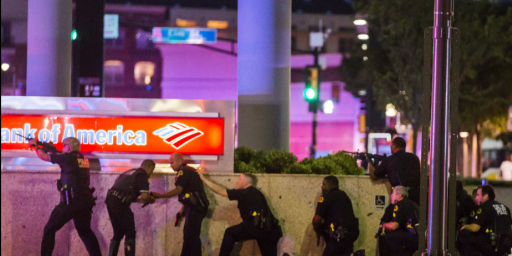
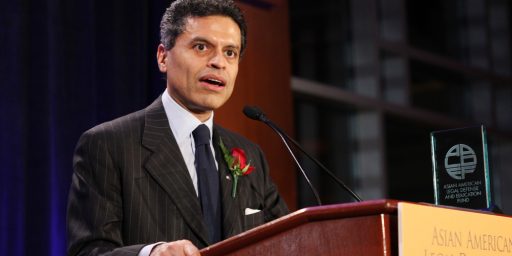
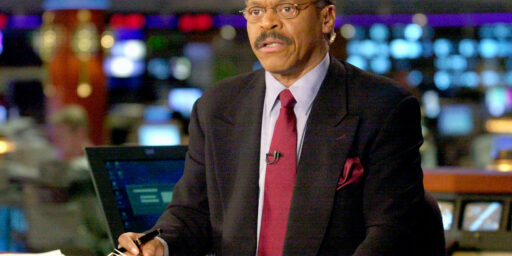
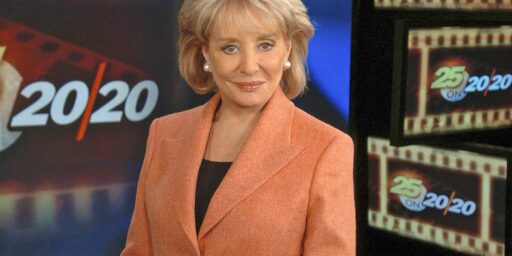
After a “Newshour” segment on a battle between Trailways and Greyhound bus lines (probably mid-1980s), the closing credits included audio of a very young Jim Lehrer announcing a bus departure at a Texas bus station. He had recorded samples of his station P.A. announcements, and got to play them years later on PBS. Way nerdy cool.
Jim Lehrer’s legacy, in journalism, in his private life, is one of honesty, excellence and decency.
I watched the Newshour last night and Robert McNeil’s final comment:
… is both beautiful, and a measure of how far we’ve fallen. There are not many people, not enough people, like Jim Lehrer around, and we know this because if there were we would not be where we are today.
Thank you Jim Lehrer, god speed.
As the Fourth Estate continues to fail this Country…Jim Lehrer, in passing, reminds us of what Journalism can, and should, be.
Rest in Peace.
A man of an earlier age. Years in military service, Jim Lehrer: 3. Years in military service, Donald Trump+Sean Hannity+Tucker Carlson+Rush Limbaugh: 0. Yet we’ve all heard complaints about how unpatriotic the press is for reporting the truth.
Sorry to be a wet blanket, but as far back as the Eighties, the NewsHour gave me fits. It was the epitome of false equivalence in interviewing. When a guest would assert an untrue claim, engage in some logical fallacy (usually an ad hominem attack), veer into an unrelated tangent, or otherwise misbehave, the instinct of Lehrer, Woodruff, MacNeil, et al. was to turn to the guest on the “other side” and say, “What do you think of that?” At no point did the interviewer take responsibility for confronting that misbehavior. And so, drop by drop, our political discourse grew more poisoned, we arrived at where we are today.
I’m holding neither Jim Lehrer nor the NewsHour solely responsible for that dark development, obviously. But I expected better from PBS, particularly given the heaps of praise that the NewsHour received over the years. (Plus, being PBS, there was less financial incentive to make the news more entertaining through messy gladiatorial combat among guests.) The lauds were often deserved, particularly for its reporting. But the interviews sucked, giving license to hacks, charlatans, and opportunists to say what they wanted.
Lehrer was a mediocre at best, and sometimes worse, moderator of presidential debates. It was the same problems as on the NewsHour, writ large on the campaign stage. Especially infuriating was his claim that he didn’t want to call out any candidate for untruths, for fear of “becoming the story.”
I regularly watched him on Newshour and thought highly of his debate moderation. It’s a far cry from journalists today who are, as a cohort, too in thrall to Twitter and soundbite clickbait reporting. And the less said about political debates today, the better.
Sadly the conditions which allowed people like Lehrer to succeed and thrive no longer exist.
@Andy: News Hour became my news source years ago. I agree that the news today is indeed not the same style of news we have today that is mainly sensationalized scandal reports and gossip.
“It’s not news” Larry King. Ted Turner says its all politics, no longer news.
@Andy: Correction: it should have read “new in the past is indeed not the same”. I will need to start proofreading, like I learned long ago. What we miss is the professionalism and demeanor. Compare that to the hollering we see and insulting manner of most of today’s main stream “news” commentators. A middle school newspaper staff is more credible.